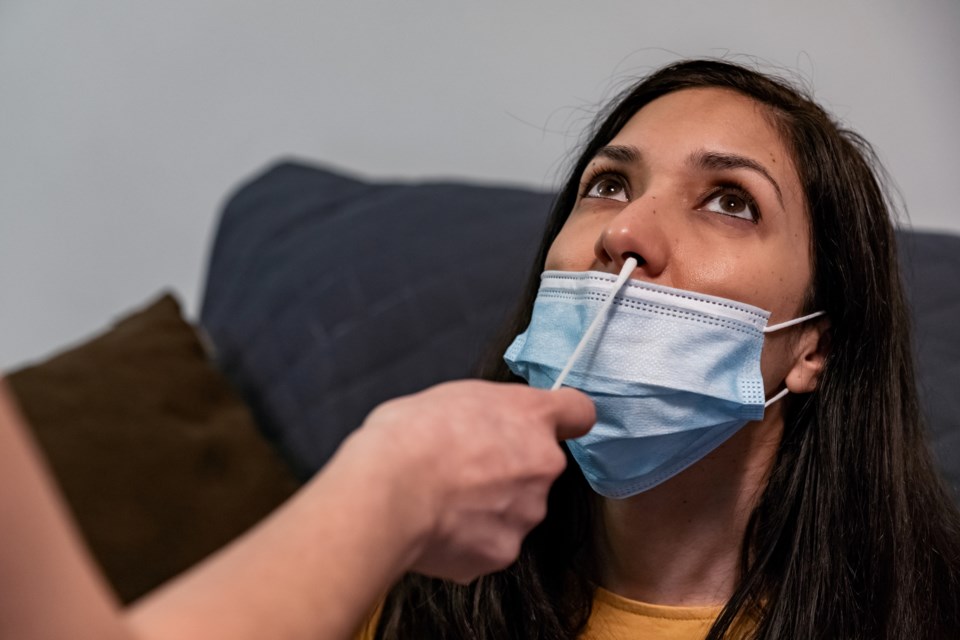COVID-19 hospitalizations in B.C. today surged to 500 – the highest count since April 30.
The number of COVID-19 patients in hospitals is a key indicator of how bad the current fifth wave of the disease is getting in B.C. because data for case counts and active infections is seen by even health officials as unreliable.
Of the 500 COVID-19 patients in B.C. hospitals, 102 are in intensive care units (ICUs). There have not been that many people in B.C. ICUs since November.
Six new COVID-19 deaths in the past day raise the province's pandemic death toll to 2,455.
B.C. Health Minister Adrian Dix yesterday provided data to show that B.C. hospitals are not yet overwhelmed. Of B.C.'s total 11,582 acute-care hospital beds, 9,401, or nearly 81.2%, were filled, he said. B.C. has a total of 728 ICU beds, of which 464, or 63.7%, were filled, he added.
Dix said that the government was looking into potentially creating a field hospital at the Vancouver Convention Centre in space now being used to provide booster doses of vaccine. He stressed, however, that this planning was in the early stages and that there was no definitive plan to create that hospital.
He and Provincial Health Officer Dr. Bonnie Henry have been telling vaccinated people who have mild symptoms to self-isolate and not burden the province's testing centres, which were overwhelmed and at capacity during the holiday season. That means that despite officials asking sick individuals to alert government of their diseases, many infections are likely going unreported.
Henry has, however, said that knowing the trend and trajectory of new and active cases remains valuable information.
Known active COVID-19 infections in B.C. have risen in each of the past 19 government data updates, and reached a record high of 36,641 today. Officials also know of 2,859 new infections in the past 24 hours.
Of the 288,939 known COVID-19 infections in the province since the first case was detected in January 2020, 246,693, or 85.4%, are deemed by the government to have recovered. In most cases, that recovery status is determined when patients go 10 days after first exhibiting symptoms. Many people deemed recovered, however, continue to suffer long-term health problems.
Older British Columbians have shown to be more vulnerable to serious infections, and deaths, so it is concerning that health-care facilities, seniors' care homes and retirement communities are increasingly developing outbreaks.
B.C. has 49 active outbreaks at those facilities, while one month ago, on Dec. 13, there were three.
In the past 24 hours, five new outbreaks at health-care facilities were identified. They are at:
• Langley Memorial Hospital;
• Laurel Place in Surrey;
• Burnaby General Hospital;
• Peace Arch Hospital in White Rock; and
• Kelowna General Hospital.
Fully vaccinated people are contracting COVID-19 in near-proportion to their share of the population, although illnesses tend to be milder and require hospital care less frequently.
Between Jan. 4 and Jan. 10, people not fully vaccinated accounted for 20.1% of cases. Between Dec. 28 and Jan. 10, those individuals accounted for 35.9% of hospitalizations.
Provincial data show 4,429,847 B.C. residents have had at least one dose of vaccine, while 93.6% of those, or 4,148,538, are considered fully vaccinated with two doses.
Most new doses of vaccine are third doses. Another 3,396 British Columbians received first doses of vaccine in the past day while 1,998 received second doses. There were a daily record of 53,907 third, or booster, doses provided in the past day, for a total of 1,292,823. Dix yesterday reiterated his promise to have about 1,000 pharmacies able to dispense third doses of vaccine by the end of January.
The B.C. government estimates that 88.9% of eligible British Columbians, older than five years, have had at least one vaccine shot, while 83.2% of that eligible population is fully vaccinated with two jabs.
The B.C. government last year estimated that the province's total population is 5,147,712. Hence, Glacier Media's calculation is that 86% of B.C.'s total population has had at least one dose of vaccine, and 80.5% of the province's total population has had two doses. •



